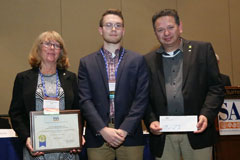April 25, 2018
Anthropology student receives national award for GIS modeling of ancestral burial mounds

Jakob Hanschu, junior in anthropology and geography, Hillsboro, is the 2018 recipient of the Society for American Archaeology/Institute for Field Research Undergraduate Student Poster Award for his independent research poster, "Quantifying the Qualitative: Locating Burial Mounds in North-Central Kansas."
Hanschu's research involved creating a predictive model to aid in the recording of prehistoric burial mounds in northeastern and north central Kansas.
Hanschu received the award at the Society for American Archaeology's annual meeting on Friday, April 13, in Washington, D.C.
"To be recognized for my research at the national level is a tremendous honor," Hanschu said. "I think my winning of this award says a lot about the quality of the anthropology program at K-State. Though our program is small, it is close-knit, which allows mentors like Dr. Lauren Ritterbush to engage with students and encourage them to be active in the field. That was a key to my success."
Hanschu was supervised by Ritterbush, professor of anthropology, during his research project on burial mounds.
"Jakob is an outstanding student with great drive and dedication not only for research, but for applying his expanding knowledge and skills toward the greater good," Ritterbush said. "His research facilitates the identification of burial sites that memorialized past Native peoples and preservation of these special sites."
The burial mounds are Native American sites that date primarily to the Woodland period in Kansas, which extends from 500 B.C. to A.D. 1000. During this period, Native Americans often interred their dead in upland mounds that overlooked stream and river valleys. The mounds are subtle, but often contain a variety of stone, ceramic, bone and other artifacts, as well as the remains of both males and females of all ages. Sites such as these are protected under the Kansas Unmarked Burial Sites Preservation Act.
Hanschu used geographic information systems, or GIS, and the Kansas State Historical Society Archaeological Site Inventory, to pinpoint locations of previously recorded burial mounds in Clay, Geary, Pottawatomie, Riley and Wabaunsee counties. He then created a predictive model to aid in identifying, and thus preserving, other possible burial mound sites.
"A favorite part about my research project is its multidisciplinary nature," Hanschu said. "It combines my majors of anthropology and geography to add to the body of archaeological knowledge in the region and create a tool for locating and preserving sites."
